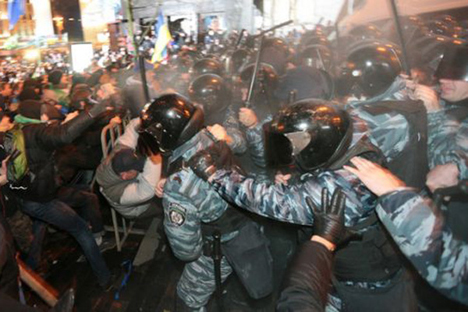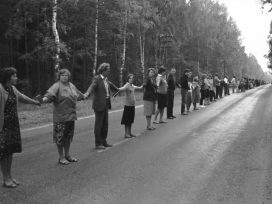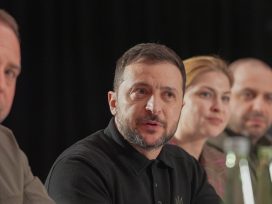Who lost Ukraine?
Almost overnight, Ukraine ceased to be a “kingdom in the middle”. Now there are only three options left, writes Ivan Krastev: sign the agreement with the EU, as the majority of Ukrainians want; join Putin’s Eurasia, as the endangered political elite desire; or go bankrupt.
Karl Marx famously remarked that major historical events occur twice – the “first time as tragedy, then as farce”. In Ukraine, sadly, tragedy and farce are inseparable.
That is why it would be a mistake to read the current wave of mass political protest, triggered by the government’s refusal to sign an Association Agreement with the European Union, as a second Orange Revolution. In 2004, inspired by the hope of joining the EU as soon as possible, Ukrainians poured into the streets to take back a stolen presidential election. Back then, the Union looked like a fantastic machine capable of making authoritarian states democratic and poor societies rich.

What has brought Ukrainians into the streets this time is something different – the fear that their country’s European prospects could be foreclosed forever. They know that their country will not join the EU in the next decade, and they know that the EU itself is in crisis. But they are determined to insist on their right to a European future. Fear of losing that hope, it seems, is at the heart of the EU’s soft power when the prospect of enlargement is fading away.
The real legacy of the Orange Revolution, reflected in the current wave of protest, is that people learned then that political leaders cannot be trusted, but that tens of thousands, gathered on Kyiv’s Independence Square, can exercise effective veto power. The major difference between 2004 and today is that, virtually overnight, Ukraine has lost its privileged status of geopolitical ambiguity.
In the two post-Cold War decades, the country has been like an oversize suitcase without handles – you can neither take it with you nor leave it at the station. It was assumed that Ukraine was divided between a pro-Russian East and a mostly anti-Russian West, and that any radical move could lead to the country’s break-up.
Ukraine’s economy is dependent on both Russia and the EU; its labour migrants go both east and west, and its no-nonsense oligarchs keep their eggs in at least two baskets. Politically, Ukraine is also a world of its own – corrupt, messy, and inefficient, but also much more pluralistic and open than Russia or Belarus. So, while it was always difficult to know what Ukrainian leaders wanted, it was easy to predict how far they could go. Unsurprisingly, Ukrainian elites have spent the last two decades making promises and avoiding commitments.
But all of this has changed, almost overnight. Ukraine is not a “kingdom in the middle” anymore. Neither Russia, determined to reintegrate the post-Soviet countries in the Eurasian Economic Community (EurAsEC), nor the EU, humiliated by president Viktor Yanukovych’s refusal to sign the association agreement, can live with the status quo. The current crisis demonstrates that the EU underestimated the transformative power of its European Neighborhood Policy – a reminder of both the strength of the EU’s political appeal and the weakness of its diplomacy.
Ultimately, everybody got Ukraine wrong. European politicians made the Kremlin believe that Ukraine was not important enough for the EU; as a result, Russia wanted not only to block Ukraine’s turn to the EU, but to bring the country into its own integration project. European leaders also overlooked the cultural contempt that the Russian leadership has started to feel for “the same-sex marriage empire” that the EU has become in their eyes.
Russia got Ukraine wrong, too. The scale of the protests in Kyiv has taken the Kremlin by surprise, because Russia’s elite has never considered civil society an independent player in national politics and failed to notice the emergence of a European consensus in Ukrainian society. But Putin correctly calculated that now, unlike nine years ago, Yanukovych is ready to use force if this is the price he must pay to maintain his hold on power.
Outsiders need to understand how high the stakes have recently become in the post-Soviet space, where two opposing integration projects are doomed to clash. There are only three options left for Ukraine: sign the agreement with the EU, as the majority of Ukrainians want; join Putin’s EurAsEC, as the endangered political elite prefers; or go bankrupt.
Published 13 December 2013
Original in English
First published by Project Syndicate and Tr@nsit online, 12 December 2013 (English version)
Contributed by Transit © Project Syndicate
PDF/PRINTNewsletter
Subscribe to know what’s worth thinking about.
Related Articles

Four NGOs in Kharkiv explain what the suspension of USAID funding means for their work. They include a media organization countering Russian propaganda, a centre providing veterans with legal advice, and volunteer groups refurbishing war-damaged buildings.

Mineral rush
Topical: Critical raw materials
Why does peace in Ukraine hang on a ‘mineral deal’ whose handling is more reminiscent of trade than negotiations? Perhaps because the global race for critical raw material mining is well and truly underway, digging for today’s equivalent of gold: raw earth elements and lithium critical for renewables and digital technology but also modern weaponry.





